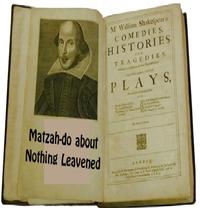In honor of his 452nd birthday on this past Saturday, April 23, 2016—the second night of Passover...
The Hebrews had been prosperous in Egypt, growing and multiplying. But the new Pharaoh became scared and decided, “I'll manacle thy neck and feet together” (The Tempest).
After many years in bondage “burdened with like weight of pain” (The Comedy of Errors), Moses and the Jewish people determined, “These strong Egyptian fetters I must break” (Antony and Cleopatra). But Pharaoh said, “NO, you ‘may not fly forth of Egypt’ (Antony and Cleopatra).”
So Pharaoh’s life became “cross’d with adversity” (The Tempest) when Almighty God brought on the plagues. With the first, God transformed all the rivers and waterways, for “Blood will have blood” (Macbeth).
After the 10th plague, God parted the Red Sea and led the Hebrews “to unpath’d waters, undream’d shores” (The Winter’s Tale). Once across, they danced and cheered: “Now go we in content to liberty, and not to banishment” (As You Like It).
And so we recounting this story must “frame your mind to mirth and merriment, which bars a thousand harms and lengthens life” (Taming of the Shrew). Let us remember, as we drink four cups, that “Good wine is a good familiar creature, if it be well used” (Othello). And don’t forget that “Unquiet meals make ill digestions” (Comedy of Errors) …
… So be filled with “joy, gentle friends! Joy and fresh days of love accompany your hearts!” (A Midsummer Night’s Dream).
Have a question for Free Library staff? Please submit it to our Ask a Librarian page and receive a response within two business days.


